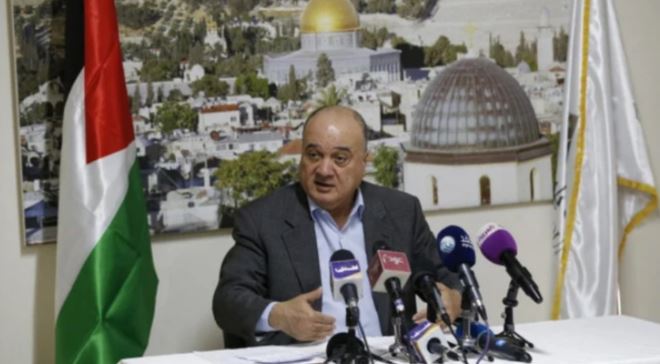RAMALLAH: A group of 67 prominent Palestinian political figures on Wednesday launched the National Rescue Initiative under the leadership of former foreign minister Nasser Al-Kidwa.
Seeking major reforms to the Palestinian political system and institutions, the initiative said: “The success of this proposed mechanism requires an application of popular, political and legal pressure to mobilize support and effect change.
“It must be affirmed that the PLO (Palestine Liberation Organization) needs to be lifted out of its crisis and rebuilt to meet the challenges.”
Palestinians, it added, are experiencing a state of decline which is unprecedented since the Nakba (the Palestinian Catastrophe of 1948), an accumulation of the absence of democracy and good governance alongside unbridled Israeli oppression, murder and settler-colonialism.
Palestinians are seeing fragmentation among Arab countries and waning regional and global support, which makes them unable to confront all of this and institute the necessary internal changes, a vital step toward contending with the present decline and averting an even worse situation, it said.
This is the first political initiative adopted and signed by prominent Palestinians to sharply criticize the rule of President Mahmoud Abbas and his unilateral approach to governance.
Al-Kidwa, who is also a former PLO special envoy to the UN and former Fatah central committee member, told Arab News: “We say that there is an accelerating loss of legitimacy because there have been no elections since 2005 and 2006, the 2021 elections were canceled, and because there is the destruction of institutions, the absence of the law, and the deterioration of the living conditions of citizens, and there is a violation of the dignity of the Palestinian citizen.”
He added: “We hope they will respond to this endeavor by the Palestinian factions, including Fatah, and take a clear position. We will work to expand and mobilize popular support as a provisional, transitional framework must be reached through dialogue between parties that accept these principles.
“There must be a collective effort to effect significant and extensive change to the political system, moving beyond what is currently established to find something new.
“Elaborating on this begins with a national dialogue yielding consensus on the composition, remit and duration of a transitional body, followed by consensus within the framework of this body regarding a tangible vision for change. General elections are then convened, the Palestinian National Council is reconstituted, and the remaining clauses of the agreed-upon vision are implemented.”
Al-Kidwa continued: “The national position used to require defending the Palestinian political system and confronting its enemies abroad and at home, and I exercised that role. But now, unfortunately, the national interest and position require serious work to change the political system in a wide and deep way, due to the unprecedented state of decadence and failure that the Palestinian situation has reached.
“It is no longer possible to remain silent on this bitter and painful reality, and it must change under any circumstances.”
A public opinion poll in the West Bank and Gaza Strip, conducted by the Palestinian Center for Policy and Survey Research in Ramallah between June 22 and 25, indicated a significant decline in the popularity of the Fatah movement and its leadership, with 73 percent of respondents saying they were dissatisfied with Abbas and 77 percent saying they wanted him to resign.
Palestinian political analyst Ghassan Al-Khatib told Arab News: “It is essential to present to the public and the elite such initiatives that point to the deficiencies and offer ideas for progress.
“However, in terms of the chances of success of such initiatives, they are limited because those in charge of them with good intentions do not have the necessary tools of influence in terms of organized parties and the public.”

